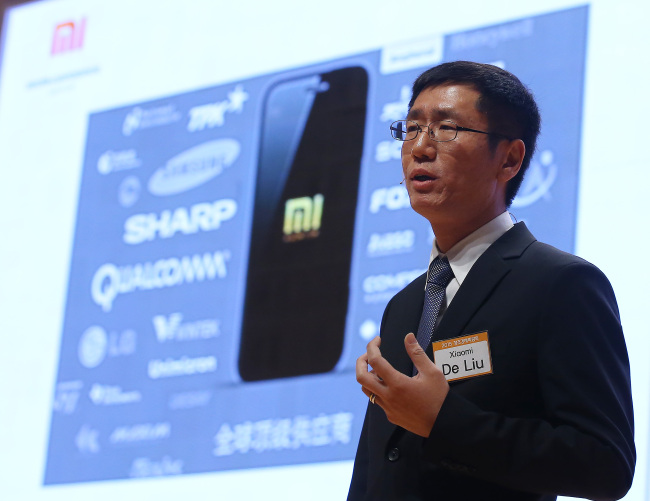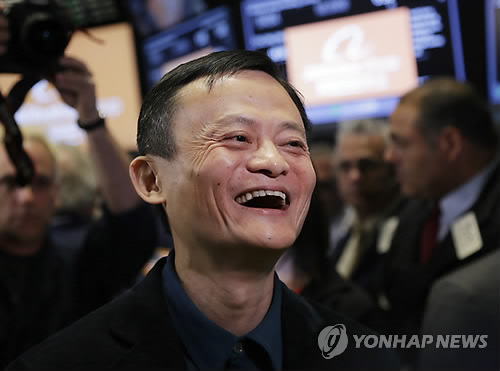In the global tech scene, Chinese upstarts armed with price competitiveness and aggressive marketing are a growing force, often posing a challenge to the traditional, bigger and more technologically advanced players.
And in their push to go global, these companies are not shying away from Korea, the home turf of Samsung and LG.
Xiaomi, the Chinese smartphone-maker often mocked as a copycat of U.S.-based Apple, has recently joined hands with Qualcomm to share patented mobile network technologies, which analysts say could have some impact on Korean smartphone powerhouses.
“The agreement could cast shadows on Samsung Electronics and LG Electronics,” said Cho Sung-eun, an analyst from Samsung Securities, adding that he sees a possible impact in the budget smartphone segment, in particular.
According to the Korean patent office, the Chinese firm has registered its trademarks for some services and products in Korea, including messenger app MiTalk and tablet PC MiPad.
And in their push to go global, these companies are not shying away from Korea, the home turf of Samsung and LG.
Xiaomi, the Chinese smartphone-maker often mocked as a copycat of U.S.-based Apple, has recently joined hands with Qualcomm to share patented mobile network technologies, which analysts say could have some impact on Korean smartphone powerhouses.
“The agreement could cast shadows on Samsung Electronics and LG Electronics,” said Cho Sung-eun, an analyst from Samsung Securities, adding that he sees a possible impact in the budget smartphone segment, in particular.
According to the Korean patent office, the Chinese firm has registered its trademarks for some services and products in Korea, including messenger app MiTalk and tablet PC MiPad.

Xiaomi’s flagship budget phablet Redmi Note 3 is expected to be rolled out in Korea soon through a contract seller, with price tags of 99,000 won ($84) for the 16GB model and 135,000 won for the 32GB model.
Many market watchers said it is a matter of time for the company to release a variety of products including budget TVs, projectors and scales.
De Liu, cofounder and vice president of Xiaomi, said on his visit to Korea last month that the Chinese firm would start business operations in Korea earnestly for smartphones and other devices.
Following the release of Redmi Note 3 last month in China, the Chinese firm is preparing to release its new smartphone Mi5, featuring Qualcomm’s latest Snapdragon 820 mobile processor, a 5.2-inch QHD display and an 8-megapixel front-facing camera, next January.
Huawei, which has grown into the world’s No. 1 player in the communications network segment from a company with a seed fund of 3 million won in 1987, has vowed to expand its businesses in Korea.
Emphasizing the firm’s focus only on the ICT sector, compared to its competitors’ business portfolios straddling different sectors, Huawei Korea CEO Kelvin Ding said “the company is confident of competing in the consumer market for digital devices,” in a press conference earlier this week.
In a bid to put more weight on consumer businesses, the company has so far released two smartphones in Korea -- the low-end X3 smartphone in September last year and the Nexus 6P last month.
Huawei reportedly sold around 70,000 units of the X3 in the first half this year, taking up a mere 0.9 percent of all domestic smartphone shipments, at 8 million, during the same period in Korea.
Even though the number is small, a market analyst said it is “meaningful,” considering it was sold through only one mobile carrier.
“Huawei is still zeroing in on the enterprise businesses -- including data servers and telecom networks -- while trying to increase its brand recognition and building partnerships with Korean firms. It will launch its other consumer products including tablet PCs and smartwatches in Korea when the time is ripe,” the analyst said.
It is expected that the 28-year-old Chinese firm’s worldwide smartphone shipment would cross 100 million units this year, up 33 percent compared to last year.
On the mobile payment front, Alibaba is increasing its presence in Korea, competing with local rivals such as Kakao, Naver and Samsung, all of which operate mobile payment solutions here.
The Chinese e-commerce giant is specifically targeting Chinese tourists to Korea, who want to pay for their purchases with ease by just tapping on smartphones.

The company, which is currently collaborating with Lotte Department Store and Lotte Duty Free, is seeking partner firms to deploy its mobile payment solution Alipay -- which has 40 million subscribers worldwide -- on Korean online commerce sites.
“Despite its relatively small market size of 52 million population, Korea, being one of the most wired nations in the world, can be attractive for global ICT firms including Chinese firms as the market could serve as a test bed for their up-to-date devices and services running on fast communications networks,” a market watcher said.
By Kim Young-won (wone0102@heraldcorp.com)









![[New faces of Assembly] Architect behind ‘audacious initiative’ believes in denuclearized North Korea](http://res.heraldm.com/phpwas/restmb_idxmake.php?idx=644&simg=/content/image/2024/05/01/20240501050627_0.jpg&u=20240502093000)

![[Music in drama] Rekindle a love that slipped through your fingers](http://res.heraldm.com/phpwas/restmb_idxmake.php?idx=644&simg=/content/image/2024/05/01/20240501050484_0.jpg&u=20240501151646)






